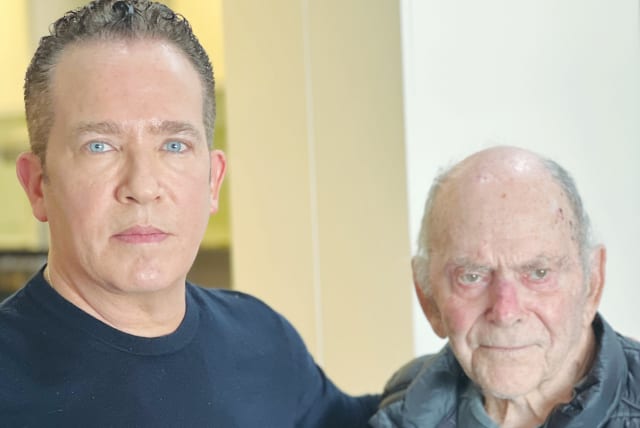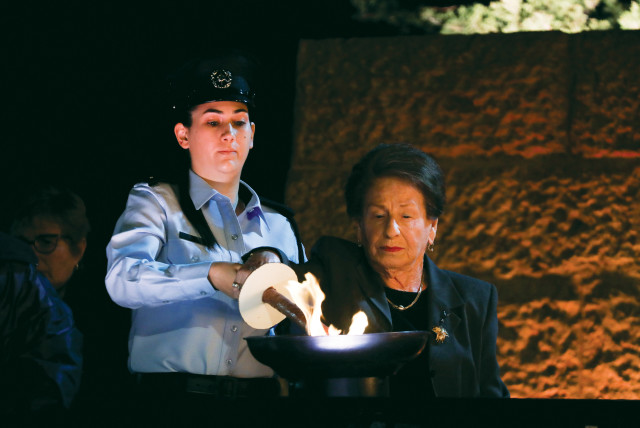Sharing the memories of Holocaust survivors is a duty, not a privilege - opinion

Driven by the urgent need to reinvent the way we preserve Holocaust remembrance, we launched the Sharing Memories project four years ago.
Relaying the Holocaust survivors’ stories to later generations is more than just remembering; it is a resounding declaration of “Never Again” for the future.
Every year, our Sharing Memories project empowers young audiences by providing a platform to hear survivors’ stories firsthand and to raise awareness around the Holocaust and the conditions of survivors. But this year, following the October 7 massacre and rising antisemitism around the globe, this mission has taken on new, and much greater, significance and urgency.
Driven by the urgent need to reinvent the way we preserve Holocaust remembrance, we launched the Sharing Memories project four years ago. Through a series of Instagram mini-documentaries capturing intimate meetings of content creators with Holocaust survivors, we connect young people with the stories of survivors.
One thing we’ve realized is that through social media platforms, content creators have the ability to transform historical events into digestible and relatable formats, while the dwindling number of living survivors makes this mission even more critical. They harness the power of technology and leverage their Instagram accounts to bridge the gap between the past and the present.
Separated by generations, the unimaginable brutality of the systematic extermination of millions of Jews has slowly lost its immediacy among Israeli teenagers, at least in the passing decades. However, the events of October 7 shattered this sense of detachment. We saw how painful and emotionally challenging it was for our survivors; no one could have imagined that their traumatic memories and experiences from the Holocaust would resurface once again, and this time in the place that was supposed to be their safe haven.
The attacks and massacres perpetrated by Hamas, the hateful celebrations, the atrocities and horrors, coupled with the ongoing antisemitic and pro-Hamas rallies in the US and Europe, all serve as a terrifying reminder that the evils of the past are not relics of a bygone era, gathering dust in history books.”
Record levels of antisemitism against Jewish teenagers
This awakening is keenly felt among Israeli teenagers but extends far beyond Israel’s borders. Jewish teenagers around the world are now facing record levels of antisemitism: online harassment, hateful graffiti, and physical attacks are no longer distant stories from a long-gone time but a chilling reality for Jewish people today.
A poll conducted by The Economist and YouGov in December 2023 suggests that one in five young Americans considers the Holocaust to be a myth. According to the survey, 20% of participants aged between 18 and 29 agreed with the statement that “the Holocaust is a myth,” and 30% did not agree nor disagree with it. In contrast, only 8% of people between 30 and 44 agreed with this statement, 2% of people aged 45-64, and 0% of people over 65 years old.
The urgency to revitalize and reinvent Holocaust education and remembrance has never been more pressing. Eva.Stories paved the way, and other pioneering projects utilizing virtual reality (like Triumph of the Spirit) have further revolutionized Holocaust remembrance, making it more accessible and engaging for today’s youth who are surrounded by technology and distractions.
The October 7 terror attacks against Israel underscore the critical need to continue and accelerate these efforts. In Israel, the solemn vows of “Never Again, Never Forget” have long guided us; however, in this year’s circumstances, we need a more timely interpretation of “Never Again” – it is no longer just a promise but a call to action.
The writer is head of communications at Meta in Israel, and cofounder of the Sharing Memories project.
Jerusalem Post Store
`; document.getElementById("linkPremium").innerHTML = cont; var divWithLink = document.getElementById("premium-link"); if (divWithLink !== null && divWithLink !== 'undefined') { divWithLink.style.border = "solid 1px #cb0f3e"; divWithLink.style.textAlign = "center"; divWithLink.style.marginBottom = "15px"; divWithLink.style.marginTop = "15px"; divWithLink.style.width = "100%"; divWithLink.style.backgroundColor = "#122952"; divWithLink.style.color = "#ffffff"; divWithLink.style.lineHeight = "1.5"; } } (function (v, i) { });

